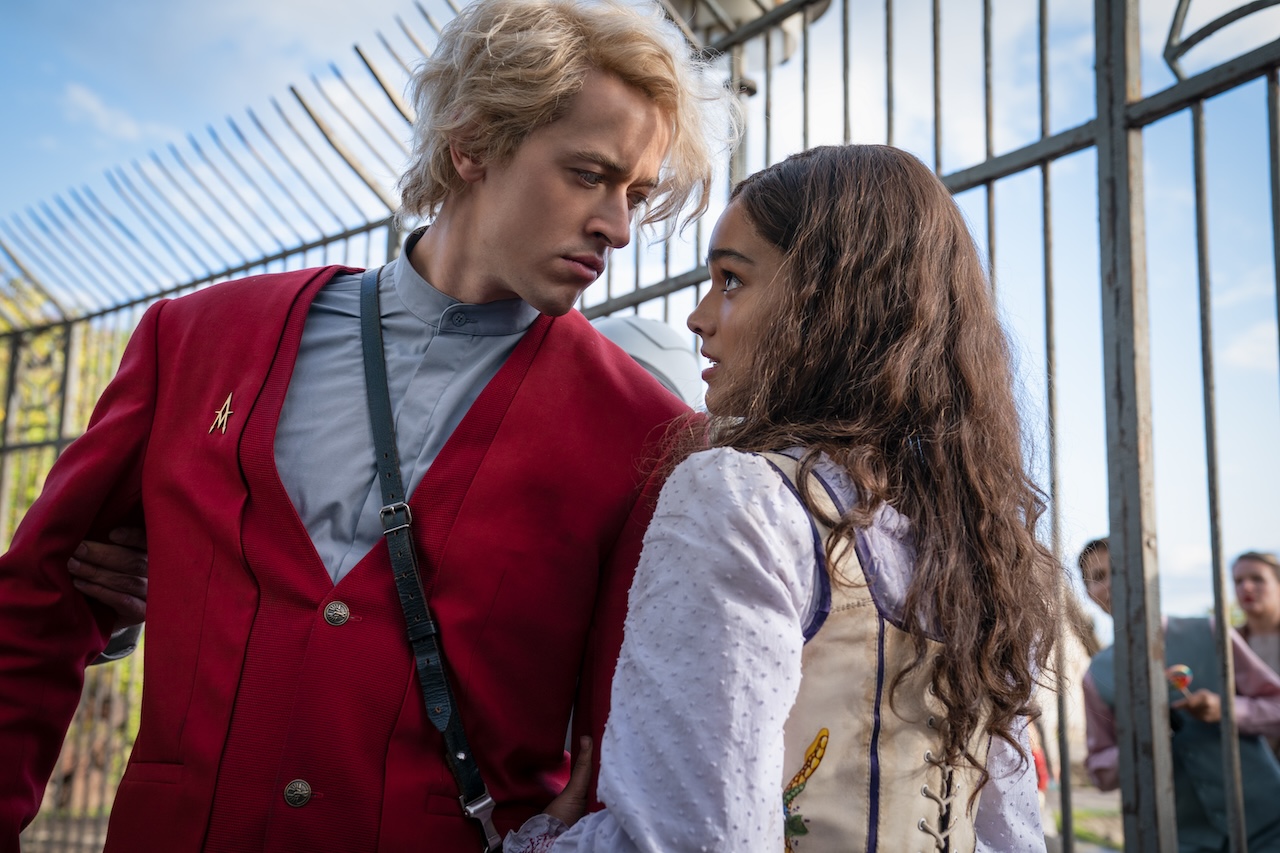Film producer Nina Jacobson has been part of the entire Hunger Games film series because she believed so strongly in the storytelling. The four films, based on the book trilogy are The Hunger Games, Catching Fire, and Mockingjay 1 & 2. They were written almost back to back by Suzanne Collins between 2000 and 2010.
The newest chapter in the saga, The Ballad Of Songbirds & Snakes was written as an origin story much later in 2020. The novel is set sixty-four years before The Hunger Games after the failed rebellion in Panem when Coriolanus Snow (Tom Blyth) became a tyrannical leader in a last ditch effort to save the failing reputation the Snow name.
Jacobson didn’t set out to create a successful franchise when she produced the first movie. “Film franchises should really happen because you’ve made something that people want more of. To presume they’ll want more from the beginning is a really dangerous and arrogant approach,” she declares.
She also has no intention of producing The Hunger Games spinoffs and remakes. The producer initially only hoped to adapt the book trilogy into films – Mockingjay has two parts. “We only started up again with Songbirds & Snakes because Suzanne gave us a book that had such rich ideas that felt as relevant and risk-taking as the original books.”
Jacobson was also weary of “sequel fatigue” that many cinema goers are experiencing, so Songbirds & Snakes had to be really special and not another item on a conveyor belt.

Nina Jacobson. Photo by FX
Songbirds & Snakes was written after a long pause from the initial trilogy, so in some regards, Suzanne Collins could approach the writing with a fresh perspective. “We always really try to work from the inside out and not the outside in,” notes Jacobson. “Suzanne writes from theme. When she wrote the first book, I think she was responding to the polarization that we were seeing all around us. People come to hate, loathe, disrespect, and disregard each other more than ever,” remarks Jacobson. The same theme underscores Songbirds & Snakes because it’s just as relevant today – perhaps even more so.
The Rise Of The Capitol – An Authoritarian Regime
The key ingredient of the Capitol is the insidious rise of authoritarianism and its current chilling parallels. “Suzanne sees how that polarization is essential to the taking of authoritarian power and the giving of that power when you fear and love the other side. She was very interested in these enlightened thinkers and these questions about the state of human nature, and who are we at heart when we believe that humans are inherently rotten and inherently violent.”
When humanity is roiled in chaos and uncertainty, “we look to extreme displays of power and dominance to protect us.” Our enemies are binary-identified as either friend or foe.
Sejanus Plinth (Josh Andrés Rivera), Snow’s fellow Academy student and Tribute mentor, challenges these dystopic ideas and espouses the idea that we can all achieve relative harmony when we see the humanity each other. “We hope our leaders will protect the rights, individuality, and freedom for all of us, even those we disagree with,” continues Nina.
Jacobson and Collins endeavoured to keep this profound, ambitious concepts alive throughout the entire series and embed them in the characters with oppositional worldviews.
“We never put a character on a soapbox. Nor are they didactic. None of the characters is pure songbird or pure snake. We had to be comfortable with plurality of these complex and contradictory characters,” she adds.
Freedom vs Control
Lucy has the meserizing song voice of an angel and the killing instinct of a snake. “Snakes are also very significant for Snow which represent his fascination with poison.”
“Not every snake is poisonous, but we always assume that they are. I love the question of something that scares or terrifies you must be deadly. Furthermore, not all birds sing their own songs. The Mockingjays sing their own tunes while the Jabberjays sing the songs they are told to.”
This distinction is significant because it speaks to the power of control and self-determination. Following his difficult upbringing and near starvation, Snow is naturally drawn to order and predictability and prefers Jabberjays to Mockingjays, while Lucy can’t bear not being able to choose her songs and is a metaphorical Mockingjay at heart. “I love this symbolism of these different birds and this notion of freedom versus control as it is represented by the birds and our movie,” adds Jacobson.
Nature can be cruel and unpredictable and societies generally prefer more rigid structures, hence the affiliation to such strong-armed regimes which offer protection in exchange for comfort and routine. People aren’t born bad, but a lack of social structure makes them so.
Adapting Songbirds & Snakes
The screenplay was penned by Michael Lesslie (Thirteen Lives, Assassin’s Creed) and Michael Arndt (The Hunger Games: Catching Fire, Little Miss Sunshine). Nina Jacobson and Suzanne Collins offered considerable feedback on the nuances of the script. Nina Jacobson and her co-producer Brad Simpson pride themselves on giving “tents of notes” before turning in drafts to the studio. They would have telephone conversations that would last for hours and dissect each draft line by line, page by page.
“We did a whole pass of the script late in the game,” says Jacobson. Considerations included where to bring back elements of Lucy Gray Baird (Rachel Zegler), a Tribute from the impoverished District 12, that were her survival instinct, how to give her more time with Coriolanus Snow, and how to keep her snake qualities alive beneath the veneer of goodness.
Jacobson quotes from a scene of Coriolanus and Lucy in the meadow after they’ve escaped. Coriolanus confesses that he’s a killer and she responds, “We both are.” He justifies her actions by saying, “You did what you had to do to survive.” Lucy understands there are elements of evil in good people and vice versa. “She is willing and able to live with the discomfort, the shame and the weight of her choices.”
Much like war or the laws of the jungle, it’s a matter of kill or be killed. We can selective recall or forget certain evil actions and even romanticize them if they in service to personal survival.

Sejanus Plinth (Josh Andrés Rivera) & Coriolanus Snow (Tom Blyth) Photo courtesy of Lionsgate
The producer adds that the difficulties in defining Sejanus Plinth’s character who acts as the moral compass of the movie. “If he’s earnest, nobody’s gonna care about him. If he is a goody two shoes, you’re not gonna understand why there would be any kind of friendship between him and Snow. You’re gonna be irritated with him as opposed to be compelled by him. We really wanted him to be the young radical idealist.”
Nina looked to her own children who are of a similar age to Sejanus (late teens) for inspiration to shape his character. “We know the how fired up you can be and how sure you can be of your ideas at this time in your life. That is a very recognizable and can be very heroic and compelling as the freethinkers endanger the status quo.”
There was also continuous finessing of the Lucy and Snow relationship dynamics as they navigate themes of love, trust, betrayal, manipulation, and truth – even under the guise of elevating both their fates. “They are both capable of convincing performances… and you know a performer is a skilled liar able to sell an idea,” quips Nina.
The filmmakers created more uncertainty in their relationship in the final version of the screenplay than exists in the book. Their romance could (and still can) go either way since they often encounter forks in their journeys.
There was also the issue of Snow’s downfall which had to be earned and organic, but not prematurely predictable. The audience had to become accustomed to the duality and complexity of his character first. He can break bad as easily as he could break good. “We couldn’t make him so sympathetic that we are forgiving the deadly choices that he makes. We need to understand them, but not excuse them. We want to make sure that you could see that he had the propensity for tyranny in him, but it was never a given.”
We are all Songbirds & Snakes – full of good and bad, love and hate, truth and lie, compliant and rebel, beak and fang.
